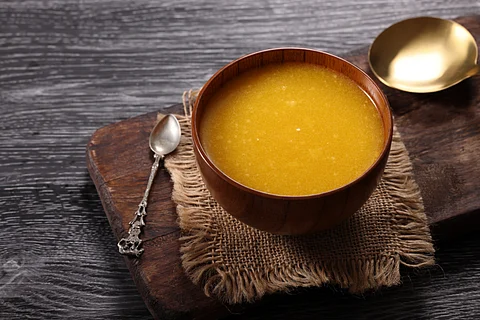

With the markets being flooded with pricier varieties of ghee (clarified butter) and other milk products that are labelled as ‘A2’, the Food Safety and Standards Authority of India (FSSAI) has termed such marketing as ‘misleading’.
India’s apex food regulatory agency clarified that the sale of dairy products as ‘A2’ is not in conformance with the provisions laid down in the Food Safety and Standards Act, 2006. It also asked the manufacturers to do away with the classification of their products as ‘A1’ and ‘A2’ and remove such labels.
It, however, allowed the manufacturers to exhaust the inventory of products with pre-printed labels within six months from the date of issuance of its official direction i.e. August 21.
FSSAI explained the difference between ‘A1’ and ‘A2’ milk fat products is merely due to the structure of a protein known as beta casein.
An instant Google search shows that markets, both online and offline, are replete with ghee that is marked as ‘A2’. It is being sold at prices ranging from Rs 999 to Rs 2,790 per litre or kilogramme.
In the wake of the FSSAI’s direction, RS Sodhi, president of the Indian Dairy Association, took to X (formerly Twitter) to welcome the government's order.
“Food and dairy companies are not allowed to claim A1 or A2 on milk or products. This is a landmark notification by the FSSAI to protect consumers from unscientific claims by food/dairy companies regarding the superiority of A2 milk, ghee, or products over A1 milk/products,” he posted.
Also, food safety experts told Down To Earth on the condition of anonymity that the selling of ghee as ‘A2’ is one of the most successful marketing gimmicks in India since the early 2000s.
“There is little evidence about the better quality of A2 ghee. But the packaging and sales pitch of these products is so convincing that people unknowingly fall for this gimmick,” a Delhi-based researcher said.
“These manufacturers also combine the ‘A2’ trick with the widely abused ‘organic’ tag and together, these two labels lure the customers into spending more money than the actual worth of the product. The FSSAI’s direction is a welcome step in ensuring that brands don’t get away by exploiting the lack of awareness amongst gullible people,” he added.
It is important to note that in 2009, the European Food Safety Authority (EFSA) had published a comprehensive 107-page scientific review which argued that there was no requirement to differentiate between ‘A1’ and ‘A2’ milk.
The ‘A2’ classification of milk and dairy products began when Auckland-based a2 Corporation came up with its products and claimed they were of better quality.
However, the New Zealand Food Safety or the Haumaru Kai Aotearoa (in Maori), which is the Australasian country’s top body on food regulation had stated: “Further research, especially involving human trials, is needed before it can be said with confidence that the A1/A2 composition of milk is important in human health.”